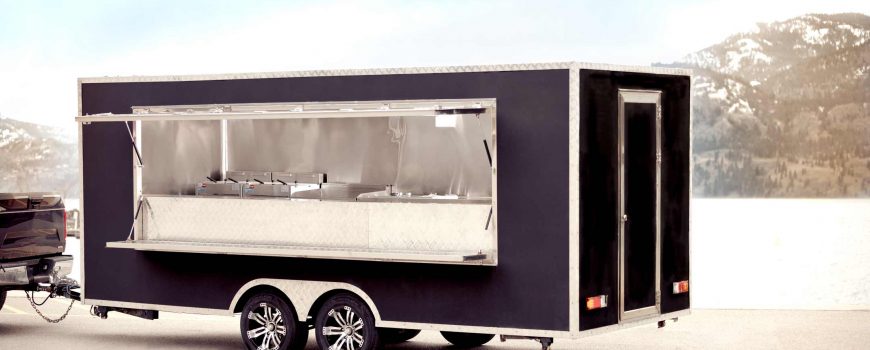Creating a Business Plan for Your Food Trailer (Step By Step)
So- you’ve found your dream food trailer, and decked it out just the way you want it.
You’ve designed your menu, full of delicious spicy tacos and fresh guacamole. (Okay- that was lunch, and it’s still on our mind, but you know what we mean.)
You’ve even selected a round of locations, set your business hours and got a head start on your licensing and permits.
What on earth are you waiting for, right?
What’s missing in the above mix is a solid, well executed business plan that could quite literally mean the difference between sinking or swimming within your first few months of business.
An often-overlooked step, a business plan helps you determine things like:
- Projected income, profit & fixed costs
- A good estimate of start up costs and how much you may need to invest or finance
- Your online and offline marketing strategy
- Your target market, your target customer and the percentage of the market you are likely to reach
- A competitive analysis, both internal and external
- Your competitive landscape
- Potential business related obstacles that may surface, and methods to combat
- Potential business opportunities, how to plan for them and how to potentially take advantage of them
- Strategic potential partnerships, customer relationship management and hiring processes
Your business plan is a blueprint for your food trailer. Without a concrete vision and strategic planning behind your food trailer, you may struggle to get it successfully rolling.
Building a Building Plan Specific to a Food Trailer
Business plans are generally comprised of the same components, but each plan has to be tailored to both the market and industry you are thinking about entering.
Creating a business plan for food trailers and the mobile food industry requires specific considerations.
And yes, of course- we have you covered.
Components of an Awesome Business Plan for the Mobile Food Industry
Executive Summary
Okay, okay- executive summaries are pretty cookie cutter. Granted, not that fun to write either but it must be done.
Keep it short, but sweet. Sum up what the reader is about to digest in much more detail and set the tone so that readers are open and willing to listen.
Business Description
In sufficient detail, outline the purpose and value proposition of your business.
The aim of this section of the business plan is to quickly and effectively communicate to both your internal team and future investors what your business embodies.
A sound business description will cover the 5 W’s- (flashback to school days, anyone?). Who are you, and what is the name of your food trailer? What is your menu offering and product offering? Any services at all? What are your goals for your business? Where are you going to be? Where will you be going? Why is this business worth getting off the ground?
Consider the following when writing your business description:
- What’s the name of your food trailer business?
- What is your mission and value statement?
- Who is your target customer?
- What is your offering? Are you operating as a completely mobile kitchen, or are you planning on remaining more stationary in a strategic spot?
- Are you focusing on lunch time crowds, or are you using the food trailer as a catering option for executive gatherings?
- What is your cuisine? What kind of menu are you offering?
- Will you be attending events, or stick to urban areas?
- When are you planning on opening your food trailer to the public?
- What are your competitive advantages?
- What is your business structure- how do you plan to operate your food trailer? Will you be looking for a full team of staff, or run your trailer solo?
Industry Analysis
Time to get a little more analytical and numbers based.
Consider both past and current data about the mobile food industry, with a little emphasis on your own specific market. Investors will want to know your industry’s size, historical growth, projected outlook and number of notable competitors.
It’s your chance to talk about the world you are about to enter into, and demonstrate your understanding of such. Place emphasis on past, current and future trends of the mobile food industry that are relative to your business.
These 12 mobile food trends show just how quickly the mobile food industry is shifting.
For example, while food trucks dominated the mobile food market for a number of years, the number of food trailers and carts out on the streets has increased 300+% over the last four years.
Your industry analysis should explore the external factors that have a profound affect on your food trailer. Typically, most seasoned food trailer and truck owners find that government licenses and regulations are a big obstacle in initial and ongoing operations.
Highlight technology developments that will help your business thrive down the line. The number of apps and websites developed in the name of helping food trailers succeed has exploded, and will continue to with the growth of the technology sector.
Check out these five websites and five apps that drive business for food trailers and trucks like no other.
Look at the mobile food industry through four scopes- political, economic, social-demographic and technical- and paint a picture for investors to understand what you are entering into.
Explore the key financial measures of the mobile food industry; industry wide sales, sales volumes and sales channels. For example, food trailers and trucks brought in 1.5 billion last year across the US, with projected growth trend of 12.4%. There are 4130 food trailers in the US alone, with each trailer generating around $200,000 in gross revenue.
Those are the kind of numbers and figures that should be intertwined through your industry analysis.
Competitive Analysis
Yes, somewhat self explanatory- but crucial.
Explore the mobile food industry’s main players, and your competitors. Who are your local competitors? If you’re a travelling act, who currently dominates the areas you’d like to focus on?
Highlight your competitors strengths and weaknesses. For example, vegetarian and vegan food trailers and trucks are absolutely slaying the market place.
More seasoned veterans have great supply chain networks, resulting in pricing that may be unattainable to a new kid on the block.
Perhaps competitors in your area operate on restricted hours, or don’t have a liquor license.
What is the competitive outlook for the industry? Explore barriers to entry, the number of food trucks expected to enter the market next year- ( hint: annual growth is 7.4% for food trailers.)
Market Analysis
This is your chance to explore and describe the very market that is going to be lining up outside your food truck.
The demographics of your target market are crucial to understand, to market your food truck and make serious profit. What do your customers like, what are their needs- where are they from, what do they have in common? Will they provide you enough of an opportunity?
A food trailer serving health conscious vegan food will certainly appeal to a different demographic than a food trailer pumping out cheesy pizza and fresh pulled pork sliders. The way you market to them and operate your business totally depends on who they are- a succinct understanding of your business and menu will be able to dial in on your target demographic.
Management & Hiring
What does your team look like?
Many first time food trailer owners opt to run solo for the first few months of operation, or until profit has turned.
For some, this may not be possible and you may plan to train an entire team from day one.
Be sure to cover how your plans for hiring affect the operations of your food trailer and how much it will cost you on a monthly basis to employ. Highlight the skills and knowledge of your existing team, and what will you be looking for in future team members to ensure perfect execution of your vision.
A food trailer offering coffee & donuts will certainly require different cooking and customer service skills than a full fledged seafood mobile kitchen. Your hiring needs will differ, so make sure these are clear.
Operations Plan
Quite simply, craft a succinct plan of exactly how your food trailer is going to work. Focus on daily business activities and strategies to support them.
Calculate your break even point, your profit margins, your supply chain, your manufacturers etc- everything that will be a part of operating your food truck, cover here.
Investors want to see concrete and sound plans for the operations of the business they are throwing money at. Investors will want to see a concrete understanding of where you’re getting your food from, the prices and how it will end up as a money making venture.
It can be a very data driven section, so using charts, graphs and tables is a great way to show processes and calculations without drowning the reader in thousands of words.
Food Trailer Marketing Plan
Marketing within the mobile food industry is quite different from marketing other industries, so forming a specific and measurable marketing plan for your food trailer is imperative.
You are quite literally demonstrating how you are going to make money- how you are going to have customers lined up outside your food trailer.
A full marketing strategy embodies many components. Consider the 4 P’s- product, price, promotion and place.
Product:
- Brand name
- Related products and services- are you offering just one menu, liquor etc.?
- Functionality
- How will your food be served and packaged?
- Food Quality
- Menu offering
Promotion:
- Advertising
- Marketing Budgets
- Promotional Strategy
- PR & Sales
- Event calendar & attendance
Price:
- Pricing strategies
- Flexibility on pricing
- Retail Price vs. wholesale pricing vs. seasonal pricing
- Price competitiveness
- Cost of supplies vs. retail cost
Place:
- Supply chain(s)
- Distribution channel(s)
- Distribution center(s)
- Logistics
- Ordering and ordering processes
- Transportation
- Warehousing needs or manufacturing needs
Financial Plan
Down to the nitty gritty; the numbers.
Your financial plan speaks to the current and future financial projections of your food trailer.
Starting from the amount of capital you need to raise, how the money will be used and how much money will need to be interjected into the food trailer over time.
For example, you may only start by offering pasta dishes out of your food trailer on the streets of New York (lower initial capital) but you may plan to expand to offer pizza in the near future- the cost of a pizza oven would need investment at that time.
Provide income statements, balance sheets, cash flow statements and projected sales/revenue. Use strong evidence and expert opinions to accurately assume future growth or the internal components of your business.
Remain transparent throughout your financial plan.



